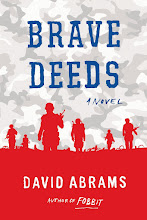My First Time is a regular feature in which writers talk about virgin experiences in their writing and publishing careers, ranging from their first rejection to the moment of holding their first published book in their hands. Today’s guest is Janis Cooke Newman, author of the novels A Master Plan for Rescue (now available from Riverhead Books) and Mary: Mrs. A. Lincoln, as well as the memoir The Russian Word for Snow: A True Story of Adoption. She is also the founder of the Lit Camp writers conference. Click here to visit her website.
My First High-Wire Act
Every day I spent writing my new novel—A Master Plan for Rescue—I felt like I was performing a high-wire act without a net. I suspect this is the way most novelists feel when they work. But for me, it was a completely new experience. Though A Master Plan for Rescue is my third book—and my second novel—it was the first time I’d ever written a book without a contract. In fact, for most of the seven years I worked on Master Plan, it was also the first time I’d written a book without an agent.
My first book—a memoir about adopting my son from a Russian orphanage—was sold on proposal. The credit for that mainly goes to the serendipity of timing. It was the tail end of the 1990s, and publishers were snapping up memoirs as fast as they were snapping up anything to do with adoption.
My second book—a historical novel about Mary Todd Lincoln—also sold on proposal. Likely because my publisher was fairly sure there was no chance of me losing my way in the middle of a book about a person who had already lived her life.
I realize it sounds enviable, to work on a book—a novel, particularly—and know for certain it will see the light of day, know it won’t end up attracting dust bunnies under your bed or stored in the cloud with that Jack Johnson music you never listen to anymore.
But here’s the thing about selling on proposal. Once you swallow that final drop of celebratory champagne, you actually have to sit down and write your book. And you have to do it on someone else’s timetable.
When I sold the novel about Mary Todd Lincoln, I promised my publisher the finished book would be 350 pages long and that it would take me a year to write it. Eight months after signing the contract, I was 500 pages into a first draft, and had barely gotten her husband elected.
Between that time and the eventual publication of my 700-page book—which did not happen for another two years—I endured an extremely uncomfortable lunch with my publisher (who repeatedly threatened to cancel my contract), the dissolution of my marriage (the blame for which, admittedly, I can only partially attribute to my book), and a six-month period during which I wrote seven days a week, leaving the house only to drive my son to and from school.
Never again, I decided.
So when I began writing the book that would become A Master Plan for Rescue, I showed none of it to my agent. I didn’t even talk to her about it. Which was fortunate, as less than a year into the process, she and I parted ways.
Writer friends offered to introduce me to their agents. But there was something freeing about not having anybody looking over my shoulder, not having anyone—even my own agent—waiting for me to finish a book. No thanks, I told my baffled friends. But I think I’m going to go it alone until this manuscript is finished.
Two years in, I stopped writing altogether, and spent a couple of months thinking about my novel. I got out my copy of John Truby’s The Anatomy of Story—the book I’m always telling my students to look at—and looked at it myself. I did all of his exercises about character desire, about want and need, about the opponent. More than once, I threw the book across the room, because Truby’s pedantic tone can be so damned irritating. But when I returned to writing, my plot held together as if it had been fashioned in some realm of inevitability, as if the things I made happen could never have gone any other way.
After another year, one of the characters I thought would be minor began to tell me more of his story—I’d always been skeptical when writers would say this kind of thing, and now I was saying it—and the whole book broke open in the most amazing way. Six months later, another character told me 80 pages of his story—which I eventually ended up cutting. But something of having written it stayed with me every time I came to put him on the page, and his character was better for it.
The point is—for once—I had time for this. Time for all the twists and turns of writing fiction. The strange paths and weird detours and blind alleys that on occasion, actually lead someplace. Like to a better book.
I have always believed that writing a novel is a leap of faith. And while I didn’t have the safety net of a contract, somehow through all the years of working on A Master Plan for Rescue, I had faith my characters would find their way into the world. And now, because of the generosity of a writer friend who offered to introduce me to his agent, because of a publisher willing to take the leap that even a finished manuscript represents, they have.
I would never tell any writer to turn down a publisher who comes dangling a fat (or even a not-fat) contract for an unfinished book. But I would tell every writer that it’s difficult to do your best work when one part of your brain is constantly running the calculation of months remaining against pages written.
I suppose the point is that what we do as writers is meant to be risky. We do our best work when we take chances. And to truly risk something on the page, means having the time to make mistakes. It’s all a high-wire act anyway—all the more impressive when done without a net.















No comments:
Post a Comment